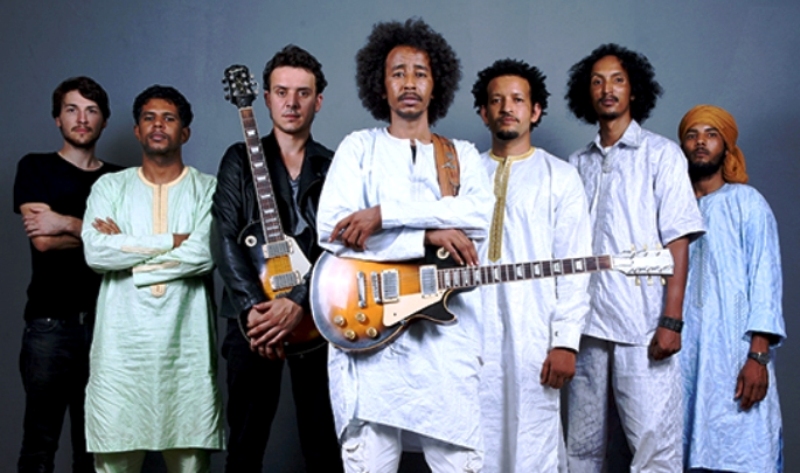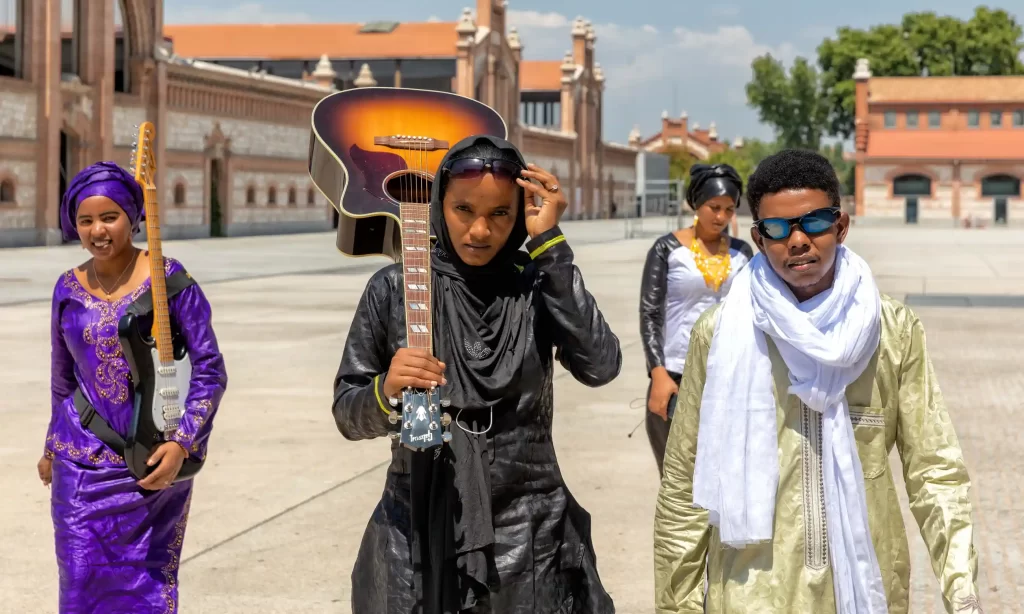Discovering Tuareg Music: The Electric Blend of Sahara Culture

They say fashion tells a story, but for Dina Yassin,…
As a music enthusiast and a lover of world music’s diverse expression, I find myself endlessly fascinated by the Tuareg people and their unique contribution to the global music scene. The Tuaregs, nomadic inhabitants of the Sahara Desert, are not just guardians of an ancient culture; they are also the creators of a musical genre that is both deeply traditional and surprisingly contemporary.
The story of Tuareg music is one of resilience and creativity. Bands like Tinariwen have been instrumental in bringing this music to the world stage. Formed in a rebel camp, Tinariwen’s music is a haunting blend of electric guitar riffs and traditional African instruments. Their songs, often sung in their native Tamasheq language, speak of the Tuareg’s nomadic life, political struggles, and love for the vast desert. Listening to their tracks like “Sastanàqqàm” from the album “Elwan,” you’re transported to the heart of the Sahara, where each note tells a story of survival and resistance.

Bombino, another Tuareg musician, infuses his songs with a blend of rock and traditional Saharan music. His album “Nomad,” produced by Dan Auerbach of The Black Keys, is a testament to the global appeal of Tuareg music. Bombino’s guitar work, combined with his soulful singing, bridges the gap between the dunes of the Sahara and the wider world of rock and blues.

Emerging from the same rich cultural soil, Tamikrest represents the new generation of Tuareg musicians. Their music, which carries the influence of their elders like Tinariwen, is infused with modern elements, appealing to a younger audience. Albums like “Chatma” and songs like “Wainan Adobat” echo the voices of the Tuareg youth, reflecting their contemporary struggles and dreams.

The beauty and mystique of Tuareg music are further amplified by the presence of female musicians. In a traditionally male-dominated sphere, artists like Fatou Seidi Ghali of Les Filles de Illighadad are breaking barriers. Their music adds a new dimension to the Tuareg sound, highlighting the important role of women in preserving and evolving their musical heritage.

The Festival au Désert, a dream of mine to attend, epitomizes the spirit of Tuareg music. Held near Timbuktu, Mali, this festival is more than a musical event; it’s a celebration of the rich culture and history of the Sahara. It’s a place where musicians from different backgrounds come together in unity, sharing the common language of music.
When experiencing Tuareg music, either live or through recordings, one is struck by the depth and authenticity of their sound. The musicians’ connection to their instruments is almost spiritual, and their performances are an embodiment of their history and beliefs. The music speaks of the vastness of the desert, the beauty of their nomadic life, and the deep spiritual connection they have with their land.

As the world becomes more interconnected, the music of the Tuareg people continues to gain international recognition. This music transcends geographical and cultural boundaries, connecting listeners from all corners of the globe with the heart and soul of the Sahara.
The Tuareg’s impact on world music is a profound collage of cultural soundscapes and heritage. Their music intricately blends the haunting melodies of the Sahara with contemporary elements, showcasing their enduring heritage and indomitable spirit. This musical odyssey navigates through time, bridging the ancestral with the modern, and stands as a resonant celebration of a culture that continuously captivates and awakens wonder.
What's Your Reaction?
They say fashion tells a story, but for Dina Yassin, it’s more than just storytelling—it’s an art, a science, and a little bit of magic. As the Co-Founder, Chief Storyteller, and Editor-in-Chief of GAZETTA—among many other titles—she’s the woman behind the words, the visionary shaping narratives, and the creative force redefining luxury fashion journalism in the digital age. With over two decades of experience in luxury brand consulting, creative direction, and trend forecasting, Dina has worked with some of the most coveted names in the industry—think Van Cleef & Arpels, Kenzo, Bvlgari, Hermès, and Chloe—all while keeping her finger firmly on the pulse of what’s next. Her work has graced the pages of Vogue Arabia, Harper’s Bazaar, Condé Nast Traveler, Mojeh Magazine, Vanity Fair, Marie Claire, 7 Corriere, and The Rake—among many other top-tier titles—solidifying her reputation as a fashion and luxury thought leader. But here’s the twist—Dina isn’t just reporting on the future; she’s creating it. Under her leadership, GAZETTA introduced EVVIE 7, an AI-driven journalist pushing the boundaries of editorial innovation. Because in a world where algorithms influence aesthetics as much as designers, Dina ensures GAZETTA stays one step ahead, seamlessly blending technology, culture, and high fashion into a platform that speaks to the modern, forward-thinking luxury consumer. Beyond her editorial expertise, Dina is a renowned luxury brand consultant, trend strategist, and creative powerhouse who thrives at the intersection of fashion, culture, and digital storytelling. Whether she’s consulting on luxury branding, forecasting emerging trends, directing high-profile fashion campaigns, or curating immersive experiences, she’s always asking the big questions—What’s next? Who’s shaping it? And most importantly, how do we make it unforgettable? One thing is certain: Dina Yassin is always at the forefront of what’s next.



